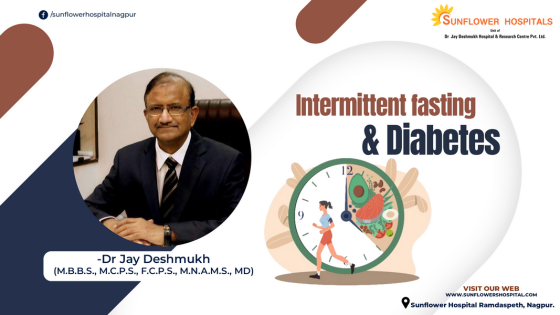Who should not undergo intermittent fasting in diabetics?
The decision should be taken in consultation with your doctor and dietitian. Very elderly, those who are suffering from other serious ailments, and those with type 1 Diabetes should avoid intermittent fasting. Pregnant women with diabetes should avoid intermittent fasting.
How does intermittent fasting work?
Most of the present treatment helps to reduce blood glucose by affecting the metabolism of glucose without going deep to find the etiology. The underlying pathological mechanisms are addressed to by exercises and dietary modifications.
Has intermittent fasting had any role in intestinal function?
Intermittent fasting alters the gut microbiome composition and enhances cardiometabolic health.
What are the benefits of weight reduction by intermittent fasting?
It helps to tame type 2 Diabetes. Loss of body weight, reduces HbA1c, blood pressure, and lipid levels. This includes triglycerides and LDL levels.
What is type 2 Diabetes?
The interplay of genes and environmental factors like food intake, exercise, and pollution play a major role. Excessive accumulation of fat leads to insulin resistance leading to beta cell fatigue and impaired insulin secretion resulting in high blood glucose
How does intermittent fasting work?
Metabolic health can be improved and weight reduction achieved by simply restricting calories. The body starts using fatty acids and ketones in preference to glucose while in the fasting state after 12 to 24 hours. Reduced levels of leptin and increased levels of adiponectin are often found in individuals doing intermittent fasting even though at times there may not be any fat loss.
What happens during fasting?
As per the reports in the Journal of Academic Nutrition Diet, fasting leads to metabolic reprogramming leading to increased utilization of fatty acids and ketones. The negative calorie balance leads to a reduction of body fat and body weight and reduces appetite. This leads to reduced insulin resistance.
What are the types of intermittent fasting?
Complete alternate-day fasting without consuming high-energy foods and drinks. The eating days can have a normal diet. Alternate-day fasting allows the consumption of 20 to 25% energy on fasting days. This is the popular 5:2 diet that allows severe energy restriction for two consecutive days a week and allows normal food for the remaining 5 days. Another way is eating for 8 hours and fasting for the next 16 hours. Periodic fasting for 24 hours up to once or twice a week with normal food intake on other days is another pattern.
Author: Dr Jay Deshmukh
Dr Jay Deshmukh is Chief Physician and Director, Sunflower Hospital, Nagpur Honorary Physician to Honorable Governor of Maharashtra and PondicherryCentral. Dr Jay Deshmukh is an M.B.B.S., M.C.P.S., F.C.P.S., M.N.A.M.S., MD From Internal Medicine – Bombay and New Delhi.


